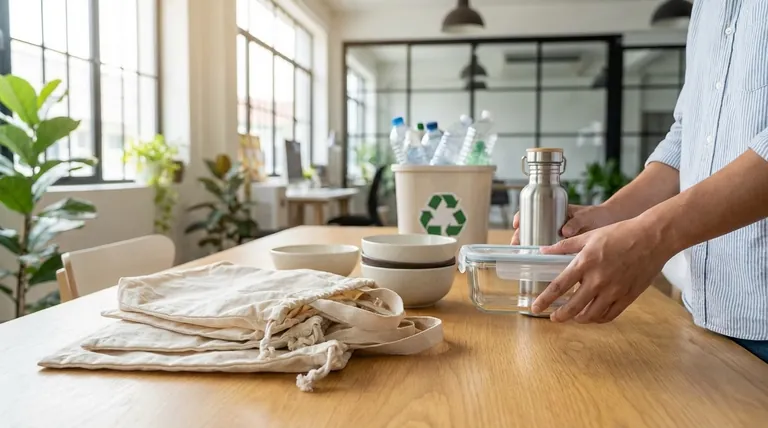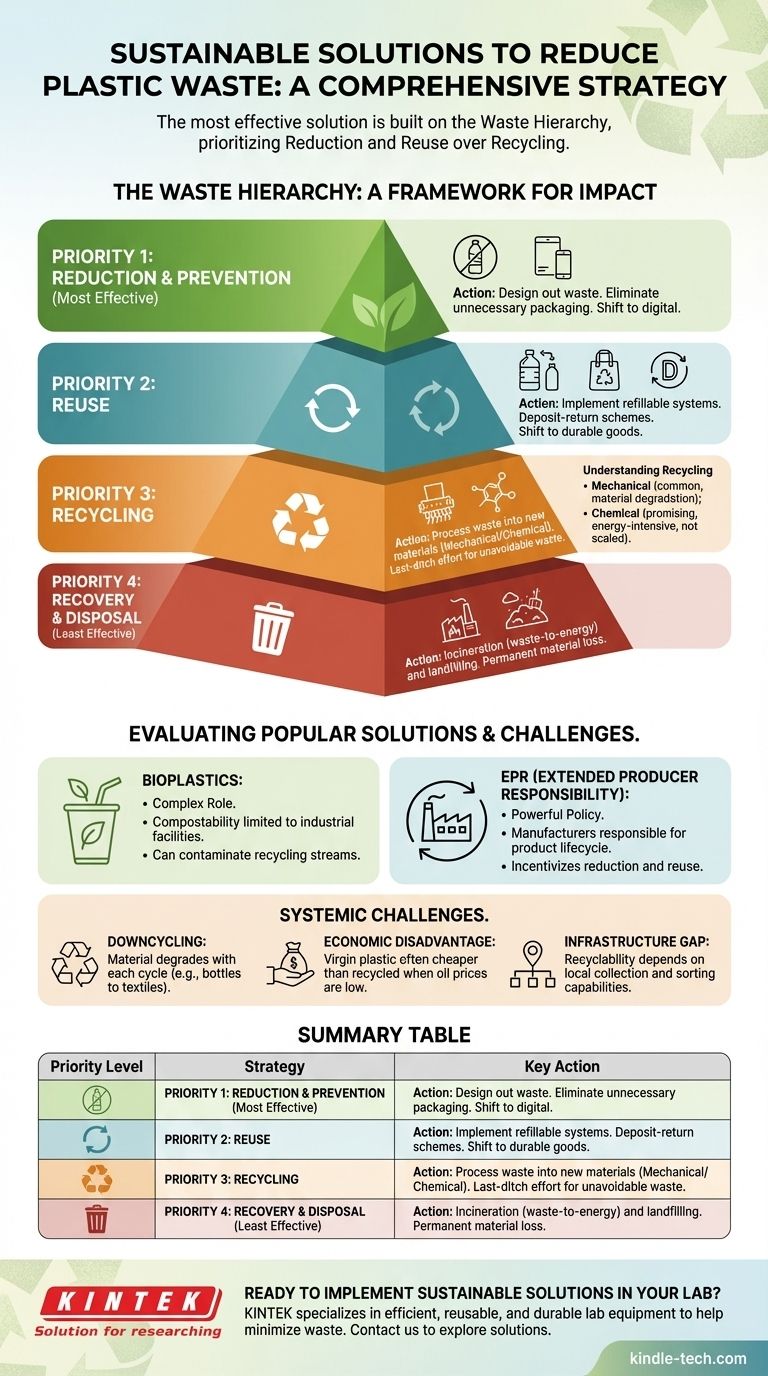Хотя ни одна отдельная технология не является волшебным решением, наиболее эффективным и устойчивым решением для сокращения пластиковых отходов является комплексная стратегия, основанная на Иерархии обращения с отходами. Эта структура определяет приоритеты действий в порядке их воздействия на окружающую среду, уделяя наибольшее внимание Сокращению и Повторному использованию задолго до рассмотрения рециклинга. Этот подход решает проблему у ее истоков, а не просто управляет симптомами.
Критическая ошибка заключается в том, чтобы рассматривать рециклинг как основное решение. Истинная устойчивость достигается за счет коренного пересмотра проектирования, потребления и политики с целью устранения необходимости в одноразовом пластике с самого начала.

Основа: Понимание иерархии обращения с отходами
Иерархия обращения с отходами — это общепринятая структура, которая направляет устойчивое управление отходами. Она ранжирует варианты обращения с отходами от наиболее предпочтительных к наименее предпочтительным, заставляя сместить акцент с проблем, возникающих на более поздних этапах (таких как рециклинг), на решения, принимаемые на более ранних этапах (таких как предотвращение).
Приоритет 1: Сокращение и предотвращение
Это шаг с наибольшим воздействием. Самый устойчивый пластик — это тот, который никогда не был создан.
Сокращение включает в себя разработку систем и продуктов, требующих меньше материала или не требующих пластика вообще. Это включает в себя отказ от ненужной упаковки, «облегчение» необходимых продуктов и переход на цифровые альтернативы.
Приоритет 2: Повторное использование
Если пластик нельзя устранить, следующий лучший вариант — максимально долго сохранять его в использовании в его первоначальном виде.
Системы повторного использования, такие как многоразовая тара для напитков и чистящих средств или схемы с залоговой стоимостью, сохраняют ценность материала и значительно снижают потребление энергии и ресурсов, необходимых для создания новых изделий. Это представляет собой переход от одноразового мышления к мышлению, ориентированному на долговечность.
Приоритет 3: Рециклинг (переработка)
Рециклинг — это процесс извлечения лома или отработанного пластика и его переработка в новые продукты. Это важная часть решения, но он является третьим по важности вариантом по веской причине.
Хотя он отводит материал со свалок, этот процесс имеет существенные ограничения, включая потребление энергии, деградацию материала и проблемы с загрязнением. Его следует рассматривать как крайнюю меру для предметов, которые невозможно устранить или повторно использовать.
Последнее средство: Восстановление и утилизация
Этот уровень включает в себя такие процессы, как сжигание отходов с получением энергии и, что наименее желательно, захоронение на свалках. Эти варианты предназначены для отходов, которые невозможно предотвратить, повторно использовать или переработать, и они приводят к безвозвратной потере материальных ресурсов.
Оценка популярных «решений» через эту призму
Многие предлагаемые решения привлекают внимание СМИ, но их истинная устойчивость может быть оценена с помощью Иерархии обращения с отходами.
Роль биопластиков
Биопластики часто преподносятся как простое решение, но их роль сложна. Некоторые из них разработаны как компостируемые, но только в промышленных условиях, а не в домашнем компостере или в открытой среде.
Более того, их производство может иметь собственный экологический след, связанный с использованием земли и воды. Если они попадают в традиционные потоки переработки пластика, они действуют как загрязнитель, потенциально портя целые партии перерабатываемого материала.
Сила расширенной ответственности производителя (РОП)
РОП — это политический подход, который возлагает на производителей ответственность за весь жизненный цикл их продукции, включая ее сбор и окончательную утилизацию.
Это мощный рычаг для Сокращения и Повторного использования. Когда компании несут финансовые расходы за отходы своей упаковки, они напрямую мотивированы разрабатывать продукты, которые легче, проще в повторном использовании и более эффективно перерабатываются.
Химический против механического рециклинга
Механический рециклинг, наиболее распространенный тип, включает измельчение, промывку, плавление и переформовку пластика. Химический рециклинг (или «усовершенствованный рециклинг») использует различные процессы для разложения пластиков на их исходные молекулярные строительные блоки, которые затем могут быть использованы для создания новых пластиков девственного качества.
Хотя химический рециклинг имеет перспективы для переработки трудно перерабатываемых смешанных пластиков, в настоящее время он очень энергоемок, часто имеет низкий выход и еще не доказал свою эффективность в крупном, экономически жизнеспособном масштабе.
Понимание компромиссов и системных проблем
Достижение циркулярной экономики для пластмасс требует признания значительных препятствий, существующих в нынешней системе.
Миф о бесконечной перерабатываемости
Большинство распространенных пластиков нельзя перерабатывать бесконечно. Процесс плавления и переформовки пластика приводит к деградации полимерных цепей, что называется даунсайклингом (понижающей переработкой).
После нескольких циклов материал теряет свою структурную целостность и должен использоваться для продуктов более низкого качества (например, пластиковые бутылки превращаются в текстиль или пиломатериалы), пока в конечном итоге не будет отправлен на свалку или сожжен.
Экономический недостаток
Переработанный пластик должен конкурировать с первичным пластиком, который производится непосредственно из ископаемого топлива. Когда цены на нефть низкие, первичный пластик часто дешевле и имеет более высокое качество, чем его переработанный аналог, что создает слабый экономический стимул для производителей использовать переработанное сырье.
Инфраструктурный пробел
Перерабатываемость продукта бессмысленна без местной инфраструктуры для его сбора, сортировки и переработки. Наличие и возможности перерабатывающих предприятий резко различаются в разных муниципалитетах и странах, что приводит к широкой путанице среди потребителей и низким фактическим показателям переработки.
Принятие правильного выбора для вашей цели
Чтобы эффективно внести свой вклад в решение проблемы, ваши действия должны соответствовать Иерархии обращения с отходами.
- Если вы разработчик продукта или руководитель бизнеса: Ваше основное внимание должно быть сосредоточено на устранении отходов на этапе проектирования путем изучения материалов без пластика и инвестирования в надежные системы повторного использования и пополнения.
- Если вы политик: Отдавайте приоритет законодательству, такому как Расширенная ответственность производителя (РОП), и предоставляйте финансирование для инфраструктуры повторного использования, что создает стимулы для сокращения отходов на более ранних этапах.
- Если вы индивидуальный потребитель: Ваша самая большая сила заключается в сокращении потребления одноразовых предметов и активном выборе многоразовых альтернатив, делая рециклинг вашим последним вариантом, а не первым.
Устойчивое будущее для пластмасс достигается не за счет лучшего управления отходами, а за счет создания экономической и социальной системы, которая не производит их с самого начала.
Сводная таблица:
| Уровень приоритета | Стратегия | Ключевое действие |
|---|---|---|
| 1 (Наиболее эффективный) | Сокращение и предотвращение | Устранение отходов на этапе проектирования, отказ от ненужной упаковки |
| 2 | Повторное использование | Внедрение систем многоразового пополнения, схем с залоговой стоимостью |
| 3 | Рециклинг | Переработка отходов в новые материалы (механическая/химическая) |
| 4 (Наименее эффективный) | Восстановление и утилизация | Сжигание, захоронение на свалках как последний вариант |
Готовы внедрить устойчивые решения в вашей лаборатории? KINTEK специализируется на лабораторном оборудовании и расходных материалах, помогая лабораториям минимизировать отходы с помощью эффективных, многоразовых и долговечных продуктов. Позвольте нам поддержать ваши цели устойчивого развития — свяжитесь с нашими экспертами сегодня, чтобы узнать, как наши решения могут снизить ваше воздействие на окружающую среду при сохранении высокой производительности.
Визуальное руководство

Связанные товары
- Алюминиево-пластиковая гибкая упаковочная пленка для упаковки литиевых батарей
- Производитель прецизионно обработанных и формованных деталей из ПТФЭ (тефлона) для лабораторных моющих корзин для проводящего стекла ITO FTO
- Электрическая роторная печь для пиролиза биомассы
- Производитель нестандартных деталей из ПТФЭ (тефлона) для моечных стоек
- Настенный блок для дистилляции воды
Люди также спрашивают
- Каковы физические свойства газообразного азота? Руководство по его силе и невидимым опасностям
- Каковы недостатки графенового покрытия? Высокая стоимость, сложность нанесения и вводящий в заблуждение маркетинг
- Какова толщина напыленного покрытия для СЭМ? Достижение оптимальной визуализации и анализа
- Что такое спекательная машина? Сплавляйте материалы без плавления для получения высокопроизводительных деталей
- Какая биомасса используется для пиролиза? Сопоставьте сырье с вашим процессом для получения оптимального биомасла, биоугля или топлива
- В чем разница между горячим и холодным набором? Откройте для себя Революцию в печати
- Какие дефекты возникают при термообработке стали? Предотвращение растрескивания, коробления и мягких пятен
- Что такое флэш-спекание? Достижение быстрой и энергоэффективной денсификации керамики







